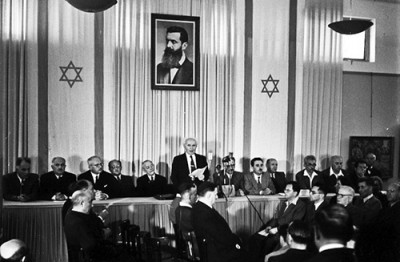
At this moment of American despair, division and distrust, celebrating Israel’s 75th anniversary can inspire Americans.
It’s become fashionable again to question whether Israeli democracy will survive or even whether Israel will survive. Actually, Israel’s 75th-anniversary celebration marks 75 years of pessimists, inside and out, predicting Israel’s demise. Once the ever-dying people, Jews founded an oft-written-off country that keeps defying death and emerging stronger. Our Phoenix Nation often gets knocked down but it comes up again.
Consider Israel’s rise from the ashes of Auschwitz in the 1940s. Zionism, the Jewish national movement to establish a Jewish state and now perfect it, preceded Hitler by decades.
Remarkably, in 1945, as World War II ended and Jews realized the Nazis had murdered six million of our people, Zionists refused to despair. Three years later, in 1948, they established a democratic Jewish state, ending centuries of homelessness and persecution.

Canadian human rights lawyer Irwin Cotler recalls learning in the 1940s as a kid that in Jewish history, there are horrors too terrible to be believed but not too terrible to have happened. With Israel’s founding, the inconceivable became possible in good ways, too.
Before Israel’s declaration of its independence on May 14, 1948 (which falls on April 26 this year by the Hebrew lunar calendar), then-Secretary of State George C. Marshall was sure Israel would not last. Marshall threatened to resign if President Harry Truman undertook the grave risk of infuriating the Arab world by backing the Zionists. When Israel’s founding premier, David Ben-Gurion, himself flouting the experts, confidently proclaimed independence and Truman followed, recognizing the state 11 minutes later, Marshall didn’t resign.
The new state had no money, weapons, bullets or oil, only, as Ben-Gurion supposedly retorted, “Hatikvah” (hope), the Jewish national anthem. Six Arab armies attacked, triggering Israel’s War of Independence. Ultimately, 6,000 of 600,000 Israelis were killed before the 1949 armistice.
Israel survived and started absorbing the world’s unwanted Jews, including Holocaust survivors and refugees from Arab and Muslim lands. The population doubled within two years, then again by 1963. Ironically, Arab anti-Zionism, which expelled 850,000 Jews from Muslim countries, helped save Israel.
During Israel’s first 25 years, the young nation kept defeating Arab armies and defying the doubters. Especially before Israel’s Six Day victory in 1967, with Egyptians and Syrians vowing to push the Jews into the sea, Israelis specialized in gallows humor: The last Israeli leaving should shut the lights out at the airport, or particularly relevant today, that if the Arabs made peace with us, then they would win because we would kill each other.
The despair, when Egyptians and Syrians surprised Israelis on Yom Kippur, the holiest Jewish day, in October 1973, had Israel’s legendary, eye-patched defense minister, Moshe Dayan, fearing Israel’s destruction—the Third Temple’s fall.
Israel counter-attacked so effectively that since 1973, no major Arab army has dared attack. In its second quarter-century, Israel evolved from a perennial underdog to a regional superpower. Israel, again, shocked the experts by making peace with its largest adversary, Egypt, in 1979, then with Jordan, in 1994. In the 1990s, Israel also tried making peace with the Palestinians through the Oslo framework.
The Oslo Accords triggered such massive anti-Oslo demonstrations and hysteria that an Israeli fanatic assassinated Prime Minister Yitzhak Rabin in 1995. Again, doom-and-gloomers insisted that Israel would never survive this rupture, especially when the Palestinians then unleashed a vicious wave of suicide bombings in 2000 that many thought would never end.
Over the last 25 years, Israel’s economy has soared. The eternally-given-up-on-nation became the Startup Nation, ranking disproportionately high in world levels of income, hi-tech investment, human development and that lovely expression of sunniness: birth rates among secular Israelis, not just the religious. This year, little, embattled, supposedly stressed-out Israel scored fourth on the World Happiness Index because tradition, community and a sense of purpose matter in people’s lives more than money, materialism and malls.
“Fascinating creatures, phoenixes,” says Harry Potter’s mentor, Albus Dumbledore. “They can carry immensely heavy loads, their tears have healing powers and they make highly faithful pets.” J.K. Rowling’s riff unintentionally captures the power of constructive liberal-democratic nationalism, which Israel’s history demonstrates beautifully.
First, healthy nationalism frees individuals to thrive while understanding that together we are stronger, better and more adept at managing whatever burdens come our way. Israelis have repeatedly demonstrated the greater meaning and personal satisfaction generated by overcoming challenges communally while being rooted in a rich identity and history.
Moreover, liberal democracy teaches us not to be defined by our tears—be they festering problems, our own failures or external attacks. We solve, we fix, we atone and we never, never surrender. Israelis have mastered that Jew-jitsu, most recently turning the horrific Palestinian terrorist slaying of Lucy Dee and her daughters Maia and Rina during the Passover holiday into a moment of national healing.
Finally, by bearing burdens communally, by progressing out of sins and wounds, strangers become patriotic citizens without always agreeing. That’s why Israel’s protesters keep waving their blue-and-white flags while remaining angry yet peaceful.
At this moment of American despair, division and distrust, celebrating Israel’s 75th anniversary can inspire Americans. Israel’s longshot story, making the impossible possible, reminds us of that optimism, resilience, faith in individual liberty and national greatness, long represented by America’s fine-feathered friend, the eagle—soaring higher and higher. That liberal-democratic leap of hope unites Zionists and Americans in believing that tomorrow will be better than today and it’s on us to roll up our sleeves and make miracles happen every day.
The writer is an American presidential historian and most recently, the editor of the three-volume set, “Theodor Herzl: Zionist Writings,” the inaugural publication of The Library of the Jewish People.
By Gil Troy/ www.JPost.com










